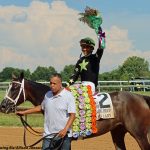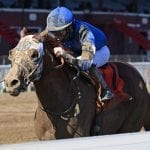CHRIS FEIFAREK HOPING FOR “HEROIC” FUTURE FOR BEREN

Chris Feifarek may have a penchant for the fantastical in literature, but when it comes to horse racing, he is nothing if not pragmatic.
On Friday morning, July 30, he sat in a box at Saratoga Race Course. It wasn’t his first trip to the track in upstate New York, but he’d never run a horse here before. He was on his own, and he was prepared for pretty much anything.
His three-year-old Beren was at Saratoga to run in the nine-furlong Curlin Stakes, one of two preps on the weekend for the Travers Stakes at the end of August. Beren came to Saratoga on a three-race win streak; his five lifetime wins had come at distances from six furlongs to a mile and a sixteenth, the latter at Parx in June in a race restricted to Pennsylvania-breds that he’d won by 9 1/2 lengths. Earlier this year, Feifarek and trainer Butch Reid took a shot with the son of Maryland-bred legend Silmaril, running him in the Bayshore Stakes (G3, seven furlongs) at Aqueduct Race Track in April.
“This race will help us determine what we do for the fall,” explained Feifarek. “Should we be thinking about the [nine-furlong] Pennsylvania Derby? He’s a Pennsylvania-bred, so he’d get double the purse money. Or should we go in the [six-furlong] Gallant Bob Stakes?”
Feifarek owns and bred Beren with long-time partner Susan Quick. He bought his first horse in 1982, and on the recommendation of his trainer at the time, he sent the horse to St. Omer’s farm, owned by Susan and her late husband Steve. When Feifarek and his wife went to visit, both a business relationship and a friendship were born.
The Quicks owned and had bred Kattegat’s Pride, and Feifarek was with them at Laurel Park on October 23, 1982 when the filly won her first stakes race, the Silver Ice Stakes. It was the first of her 10 stakes wins, including the 1984 Gallorettte Handicap (G3).
“I had never personally known anyone who owned a racehorse, and I was hooked,” Feifarek remembered. “She kept winning and winning, and I was her biggest fan.”
Kattegat’s Pride was bred twice to Horse of the Year Spend A Buck, and her second foal was a filly named Kattebuck. By this time, Feifarek had become a partner in the dam and was the co-breeder of record of the foal. Kattebuck didn’t inherit her parents’ talent and was retired after 16 starts and one win—the Quicks refused to run her in a claiming race.
- MHBA announces board election results
 The Maryland Horse Breeders Association (MHBA) today announced the results of its board of directors election.
The Maryland Horse Breeders Association (MHBA) today announced the results of its board of directors election.
A couple of her early foals were modest successes.
Kattebuck’s 2001 filly was by Diamond, offering Feifarek the perfect opportunity to indulge his literary interests.
“The prequel to The Lord of the Rings is The Silmarillion,” he said, offering a “Tolkien 101” to an uninformed interlocuter. “Both works mention the Silmarils, three jewels that were created by the elves. The short story is that they are three glowing, iconic, sacred jewels that were stolen, and there were five wars to try to get them back.”
“Glowing, iconic, sacred jewel.” Silmaril was a pretty good name for a horse that would earn over $1 million and win 13 stakes races, including the Maryland Million Distaff, the Grade 3 Endine, and the Pimlico Breeders’ Cup Distaff Handicap (G3). That last named win, in 2005, came against champion and future Hall of Famer Ashado.
It was Silmaril’s 2018 colt by Weigelia that Feifarek came to Saratoga to see, a colt that continues the Tolkien theme: it was Beren who recovered one of the three precious Silmarils.
“He was a big hero,” said Feifarek.
Unfortunately, his namesake was unable to turn in a heroic effort in the Curlin. The race played out exactly as Feifarek had hoped—Beren and jockey Frankie Pennington sitting in second, and Pennington said later that at the quarter pole, he thought that he had plenty of horse left.
But the added distance did him in, and Beren finished last in the field of seven.
Though disappointed, Freifarek was philospical the next day.
- CNL: Audley Farm well represented in weekend stakes
 Audley Farm bred or owns two favorites and a second choice in this weekend’s four stakes at Colonial Downs, with two for distaffers on Saturday.
Audley Farm bred or owns two favorites and a second choice in this weekend’s four stakes at Colonial Downs, with two for distaffers on Saturday.
“I fully anticipated this as a possibility,” he said. “It was the distance and the level of competition. Beren came back from the race in good shape, and he scoped clean. And now we know. I’m glad that the race was a definitive, honest answer. These are all things to be grateful for.”
He mentioned that Reid had been concerned about the colt’s final workout, a speedy four furlongs in 46.60 at Saratoga, a bullet work of 87 horses to breeze on July23.
“Butch said that he probably should have scratched,” said the owner. “But you learn something even from a bad race.”
Freifarek also noted that the race was Beren’s eighth of the year, and that perhaps the horse just needs a rest. His 2021 record is 8-5-1-0; in 11 lifetime starts, he’s earned $290,000.
And there’s at least one very good reason to hope that those purse earnings continue to go up. Freifarek and his wife have a 35-year-old autistic son, and his wife is a co-founder of Itineris, a Baltimore-based organization that provides services to adults on the autism spectrum.
“We donate 10% of purse earnings to the organization,” said Freifarek. “When our son was turning 21, we couldn’t find any place that offered services for him, so my wife and some other parents got together to create one.”
“So we hope,” he said with a smile, “that he earns a million dollars.”
That would make Beren the horse a kind of hero – just like his namesake.
LATEST NEWS
















Super cool column. I told more than a few people Beren was who I wanted to win and would be toasting to,for good luck of course. Butch Reid is amazing with the offspring of Beren’s sire. Johnny Ritt,as another example. I absolutely love it when these non-millions of dollar horses show what heart and talent they have. Modestly bred horses can do it too. I think he (Beren) might have been too keyed up. It was fun regardless. All the best to Christopher and connections,for a bright future.